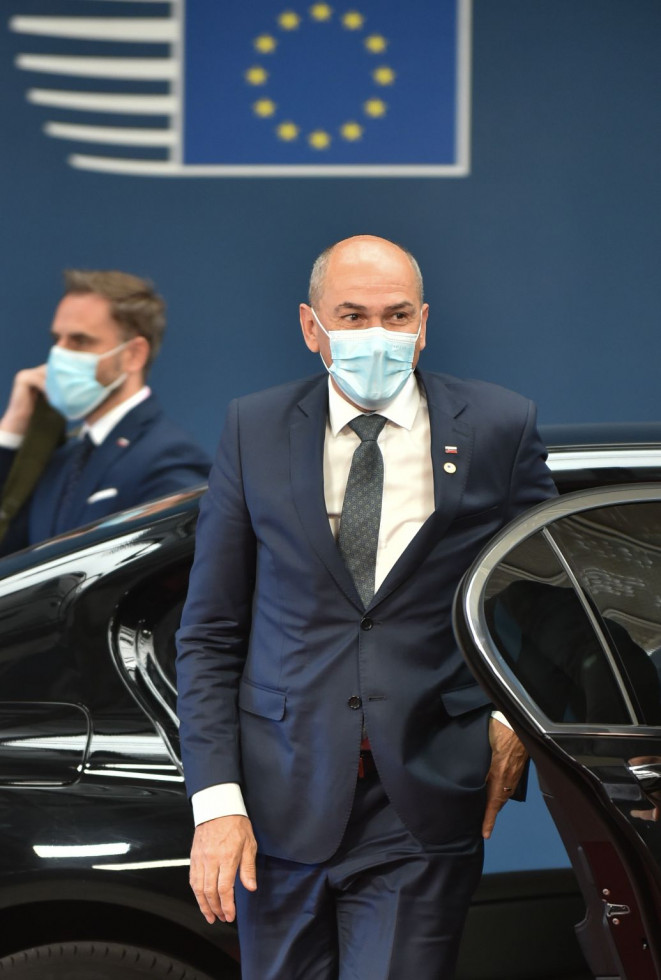Prime Minister Janez Janša: There will be enough vaccines available, as their supply will increase in the third quarter
- Former Prime Minister Janez Janša (2020 - 2022)

Prime minister Janez Janša | Author KPV
In today’s statement to the media upon his arrival at the meeting, Prime Minister Janša said that there were many topics on the agenda yesterday. "In my opinion, the most important topic, where we have also made the greatest progress, is the preparedness to continue to recover from the pandemic. An encouraging piece of information that we received is that the supply of vaccines will increase in the third quarter. There will be enough vaccines available. A key problem, however, will be how to use all the resources available to the European Union and the member states to ensure that as many people as possible get vaccinated in all member states and how to make the European digital COVID certificate, which is also a major incentive for vaccination, fully operational as quickly as possible," the Prime Minister began his address. He went on to say that "there was a general consensus that the highest possible vaccination coverage rate – one that exceeds the percentages we previously discussed – is key to protecting against new variants of the virus, i.e. from the delta and delta plus variants and all the other variants that are sure to emerge and will be more dangerous if individual countries, Europe and the whole world do not achieve high vaccination rates as soon as possible."
Asked about Slovenia's position with regard to Hungary’s adoption of its new legislation on the LGBTQ+ community and the European Council discussion on this matter, the Prime Minister responded that the discussion was not about adopting positions, as there was no text or proposal on which they needed to make a decision. "It was a sincere exchange of views that, at times, got very heated. Slovenia and many other countries do not want to be part of any new divisions in Europe. There were enough of those. We have joined the EU to become united, not divided," added Prime Minister Janša and continued: "If there is a problem with any law in any member state, the Commission can resort to legal mechanisms and procedures. This is not the first such case and, in the end, we always get a legally-binding decision that we must comply with." Asked about whether the EU may toughen its position against Hungary, the Prime Minister responded that if proceedings against Hungary would be initiated, they would also be carried out. "However, the exchange was very heated at the beginning because positions were mainly formed based on media coverage, but after the facts were clarified, it became clear what might actually be controversial, and the discussion continued in a much calmer manner. I also think that this will not cause any unnecessary new divisions," said Prime Minister Janša.
Asked about the approval of the recovery and resilience plan, the Prime Minister said that Slovenia would host the entire European Commission on its visit on 1 July, at which point there will most likely be an announcement on the approval of the plan. "All of these formal approvals are linked to the visit of the President of the European Commission or, in our case, of the entire Commission. Regarding the decisions that have to be adopted later in the Council, there are still some outstanding issues, however, not in relation to Slovenia, but in general," said the Prime Minister. Regarding the approval of the plan, he added it should be taken into account that "at the beginning, when the leaders reached an agreement on this topic, they also reached an informal agreement that priority be given to the countries that were most affected, especially to those countries with a large share of GDP from tourism, and Slovenia was not one of them last year".
Asked about the European delegated prosecutors, which was also a topic of yesterday's discussion in the European Parliament, the Prime Minister said that prosecutors would be appointed as soon as the procedure was concluded in accordance with the national legislation. "Slovenia is not withdrawing from this process, but we are obliged to carry out a watertight procedure." The Prime Minister said it was more important to remove any suspicion of doubt from the procedure than to rush it. "The European Public Prosecutor's Office is not the only office protecting the legality of the use of EU funds – all prosecutor's offices are obliged protect it, even in those countries that are not a part of this mechanism at all," added the Prime Minister.

